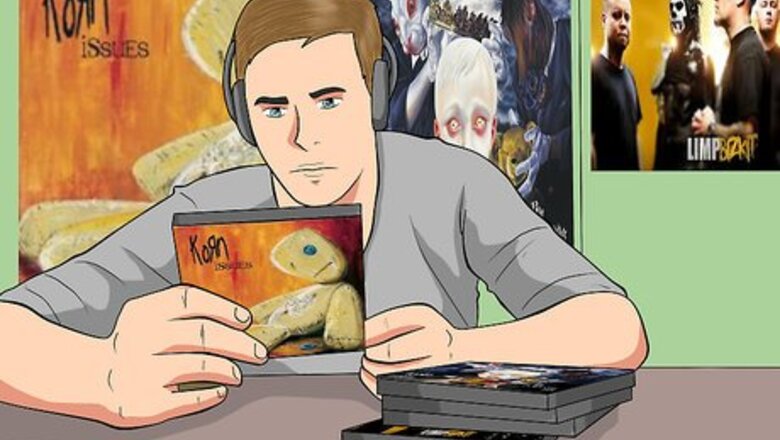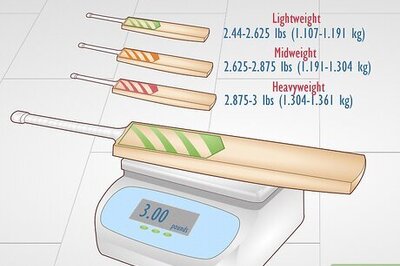
views

Remember the good old days. Go down to your local music store, they're bound to have loads of nu metal albums & at low prices too because some of them are over 15 years old. A good selection to purchase are (but not limited to) Korn's Follow the Leader, Deftones' Adrenaline, Limp Bizkit's Three Dollar Bill Yall$ & Slipknot's eponymous debut. Blast them out your speakers really loudly to attract interest from passers-by.

Learn about what inspired these groups. Korn didn't create a whole genre without a bit of help from the bands they listened to. Their influences are as diverse as Pink Floyd, Metallica, Sepultura, Nine Inch Nails, Ice Cube, Tool, Faith No More & Pantera. Deftones started putting hints of The Cure into their music & Limp Bizkit drew heavily from rap metal band Rage Against the Machine.

Start gauging interest online. When nu metal started out, everything had to be done with ink & paper flyers distributed around local music scenes. Thanks to the rise of the internet, you can now use Facebook, Twitter & other social networks to gain support. Ask whether the demand is there for nu metal to return & start looking for fellow musicians to audition.

Get a Singer with a wide vocal range. Nu metal has a great variety of styles to draw from, including rapping, singing, scatting, yelling, death growls & whispers, sometimes all in the same song. Hiring someone with an erratic & unpredictable on-stage presence will fuel live performance situations & make your new group stand out from the rest.

Get a guitarist (two would be preferable). If you can find someone with a unique playing style all the better. Munky from Korn & Mick Thompson from Slipknot use a wide range of effect pedals to create sounds of scratchy DJ turntables & wailing emergency sirens, & Limp Bizkit's Wes Borland plays with both of his hands driving the sound. It can be hard to find a musician that sounds incredibly distinct, so don't "fret" if you can't find one.

Try to Make the guitars sound truly nu metal. The earliest bands eschewed the standard E Tuning (EADGBE) in favor of Drop A, the lowest possible tuning from a standard guitar. Korn in particular would play with 7-string Guitars tuned AEADF#BE, but Drop C Tuning (CGCFAD) eventually took over as the choice of later artists.

Get a bassist. Choose someone who knows how to make their instrument stand out, because now they have to compete with guitars that are tuned almost a thunderously low. Try listening to the basslines of Korn's Reginald "Fieldy" Arvizu, who uses the Fingerslap technique to create percussive funk tones. Just like the guitars, the extra string makes all the difference, so try playing a bass with 5 or even 6 strings.

Get a drummer. Try finding a sticksman who's inspired by other genres of music (Funk, Latin, Hip-hop etc.) & can play very loudly & aggressively. The drum kit can be as minimalist or extravagant as you want, but you'll probably want at least three tom drums, a kick drum, lots of dark & trashy cymbals like Zildjian Ks & Sabian HHXs, a large snare drum & a smaller side snare for playing Hip-hop beats.

Depending on your preferences, get a DJ. Artists like DJ Lethal from Limp Bizkit & #0 from Slipknot use turntables, sample pads & keyboards to enhance the broody guitars sounds. They can be very subtle & atmospheric (as they are in Deftones for example) or in-your-face like the previous artists' styles. Remember from earlier that some bands prefer to use guitars to make these sounds. Check out "Bullet in the Head" or "Bulls on Parade" by Rage Against the Machine for a greater idea of how a guitarist would sound over a DJ.

Find a good producer to help you make an album. Though he's since discredited the genre, Ross Robinson was responsible for the debuts of Korn (along with their 2nd & 9th LPs), Limp Bizkit & Slipknot, & also turned Thrashers Sepultura & Machine Head onto the movement, so he would be the best man for the job. Other recommended producers are Rick Rubin, Terry Date, Don Gilmore & Nick Raskulinecz. If you have no chance of contacting these people, find someone in your area who can help you, or produce the album yourself, a surprising amount of artists do this.

















Comments
0 comment